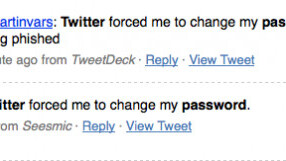
 I’ve been in the social media space now for quite a few years and I meet with at least 5 companies each week who have understood the importance of utilizing social media for their businesses but are still afraid of entering their brands into the new media age.
I’ve been in the social media space now for quite a few years and I meet with at least 5 companies each week who have understood the importance of utilizing social media for their businesses but are still afraid of entering their brands into the new media age.
What are they worried about? Here are the top five concerns that I’ve heard from executives and my response to them:
1) They’re afraid they’ll lose control of their brand and open themselves up to negative feedback.
When you open a business and start marketing your services and exposing your brand to others, people will start talking about your brand. And this is what you wanted right? This is why you exposed them to your brand in the first place. People are going to be talking about your brand no matter what.
The question is:Do you want to be a part of the dialogue or do you want to just play ostrich and ignore what people are saying? If a person is dissatisfied with your services, do you prefer he opens up this discussion in a “I hate <your brand>” group opened up by another hater or do you prefer that he come to your page and post the complaint there allowing you to respond appropriately and even perhaps win him back as a client?
Social media didn’t create the dissatisfied customer – it only allowed him a platform to express his frustration. If you don’t give him the stage to speak, he will do it elsewhere and believe me, it will cause a great deal more damage to your brand if you’re not there to respond and open to criticism.
When we speak of social media, we speak of conversational marketing – listening before selling, opening a dialogue with the user and not just throwing a blinking banner in his face. Brands need to make that switch in their heads and understand that social media is SOCIAL. Many conversations will be positive and you will have these nice messages recorded for everyone to see publicly – your bosses, your investors, your customers and potential customers:
Some conversations may be negative but these conversations should be seen as welcomed opportunities to regain customers. If you utilize social media effectively and are alert to what people are saying about you online, then you can also respond in a timely and intelligent manner. When you’re dazed and confused and too afraid to see what people may be saying about you, that’s when the conversation can get out of control and your branding and positioning can go out the window. Companies who understand social media know that by using social media they are increasing the number of positive responses to their brand and making sure to control and decrease the negative responses by showing people that they actually care about what they have to say.
2) They don’t understand it
Companies fear social media because they don’t understand what to do with it, what to talk about, who to turn to. They often time try to do it in-house without the appropriate guidance, fail miserably and then say that social media doesn’t work. Don’t hire your friend’s son who is very active on Facebook to do your marketing strategy for you. Just like you wouldn’t fix your car in-house or do your PR in-house, neither should you start doing social media on your own without having a social media guru at your side. And when I say guru, I mean someone who has had a good track record in creating successful social media campaigns for other companies in the past. Once you have such a guide at your side and you begin to understand what social media is all about, then you will not be afraid of it anymore and you will start to recognize the infinite number of amazing opportunities that social media will open your brand to.
3) The effectiveness of social media is hard to measure
Since social media is still in it’s diapers, it took a little while for tools tracking the ROI on social media campaigns to emerge, however today we have a suite of different tools that allow companies to track even the most minute details in the effectiveness of their social media campaigns.
Tools like Google Analytics which allow us to track the traffic coming into our site as well as where it’s coming from has existed for years. Google alerts which allow us to see the blog posts and other sites linking back to our site have also existed for a long time. And we are now seeing an influx of services that not only allow you to easily monitor what people are saying about your brand but also see who are the top influencers, opinion leaders in your industry and more. There are numerous services that allow you to see the top influencers on twitter such as: Twitter grader and twitter analytics services such as Twitalyzer . Facebook also provides its own insights to page admins and enables admins to view information regarding the demographics of their fans and also how many interactions, comments, wall posts, etc. were found on the page. The more we learn about social media, the more tools we get to measure it.
Not only are our efforts in the social media realm measurable but social media campaigns also allow us to target specific campaigns to specific niches like no other media today.
4) They’re afraid that employees will be on Facebook and twitter chatting all day.
Facebook today has around 350 million users. If Facebook was a nation, it would be the world’s third most populous after China and India. Your employees are there anyway. Why not utilize the fact that they are there to help your cause? When you need to spread the word on Facebook, why not enable your employees to help you or when you finally open that fan page on Facebook, why not allow your employees to become fans and encourage them to take part in your social media activities. Dell for example, who is well known for their great twitter strategy (a strategy which has earned them $6.5 million to date), has around 200 employees working its twitter account, responding to people.
In addition, not allowing your employees to have access to the vast amount of information that can be found on social networks as well as not enabling them to use these networks as research tools nor to network with people in the industry also puts your company at a great disadvantage to your competitors who do allow their employees (and even encourage them) to use social media tools.
5) Social media is costly.
This last fear is not only something that companies should not fear but it is also not true. If you consider the millions of people that you can reach using social media as opposed to the cost of buying an ad on TV or buying a banner, you’ll see that social media is one of the most cost efficient ways of reaching your target audience today.
To anyone who still thinks social media is a fad, WAKE UP. It’s not. Social media is here and it’s here to stay. If you took a look at the latest report that came out of Davos regarding social networks, you’ll see that Facebook is now the second most popular site on the internet after Google and that according to Nielsen since February 2009 people have been spending more time on social-networking sites than on e-mail, and the lead is getting bigger. The question for your brand is no longer whether to be there or not to be there. The question is WHEN will you be there and the longer you keep your head in the ground, the more you’ll lose touch with what’s happening out there in the real world.
Great Ostrich pic credit: http://blog.karmona.com
Get the TNW newsletter
Get the most important tech news in your inbox each week.





